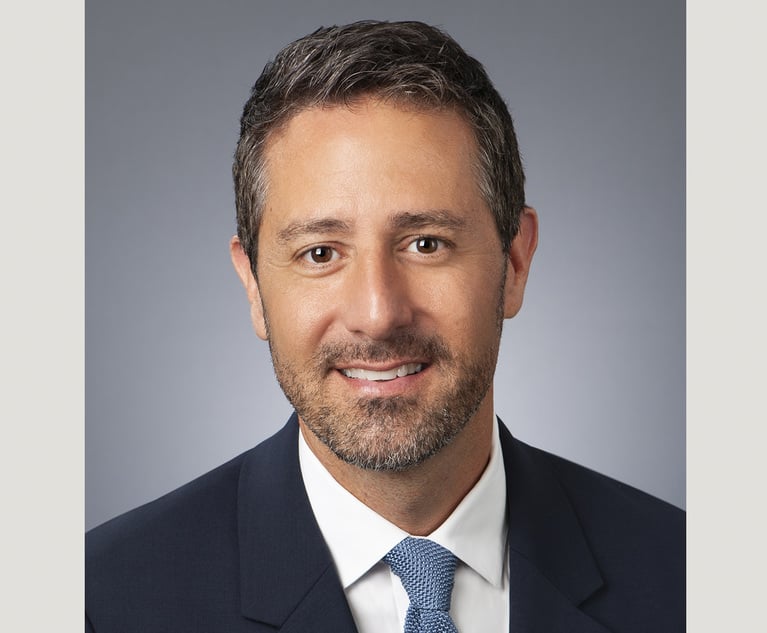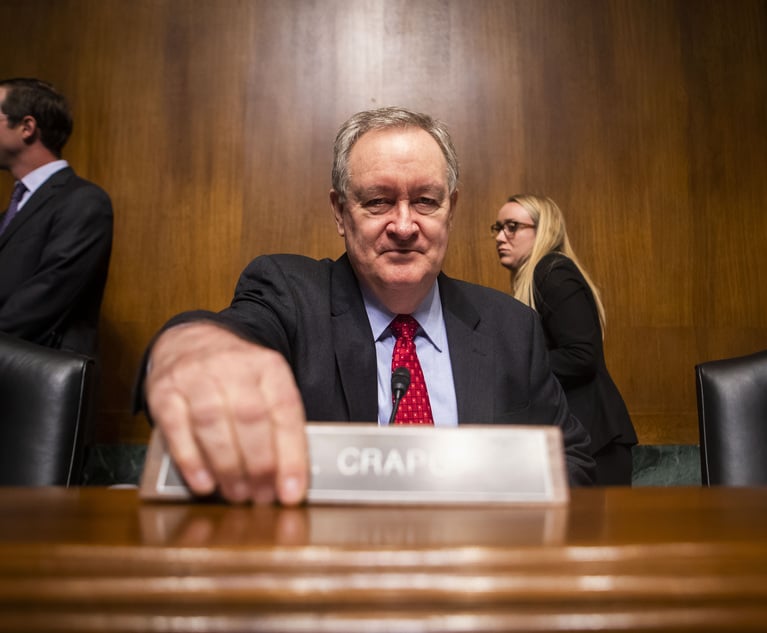How the COVID-19 Crisis Is Reshaping Alternative Dispute Resolution
As with law firms, many alternative dispute resolution organizations had to transition to fully remote operations to comply with shelter-in-place orders virtually overnight. And some experts predict that the imprint of the pandemic could outlast the crisis.
March 27, 2020 at 06:52 PM
7 minute read
 (Photo: Shutterstock.com)
(Photo: Shutterstock.com)
Retired federal Judge Vaughn Walker suspects that the alternative dispute resolution industry won't snap back to the way things were before the COVID-19 pandemic forced many lawyers and neutrals to work from home.
The former chief judge of the Northern District of California now works as an arbitrator and mediator for FedArb in San Francisco. As the coronavirus contagion worsened in the United States, Walker saw a number of scheduled mediations drop off his calendar. But in the last week or so, he's seen more interest in online mediation, and said parties in at least one of his cases seem interested in moving forward via video conferencing platform Zoom.
"I think the fact that we've been forced to use these technologies—it's going to stick," he said. "It's not going to take over the whole range of business, but more and more I think you're going to see use of these technologies, which will save on travel time."
As with law firms, many ADR organizations had to transition to fully remote operations to comply with shelter-in-place orders virtually overnight. And Walker is not alone in his prediction that the imprint of the pandemic could outlast the crisis.
In mid-March, JAMS began transitioning to online ADR. In the last week, the organization has proceeded with hundreds of cases through video conferencing, said Kim Taylor, senior vice president and chief legal and operating officer at JAMS. "They're going well. The cases are settling," Taylor said.
To help neutrals and clients get more comfortable with remote mediation and arbitration, JAMS has hosted dozens of trainings on its video conferencing platform Endispute powered by CourtCall.
Taylor said a more permanent acceptance of remote resolution seems to be inevitable. "The ADR industry has been promoting online dispute resolution tools for a while," she said. "There's been some resistance. Now that some people have been pushed into it sooner than expected, I predict that it's going to be just a part of how we offer services going forward."
Gilda Turitz, a neutral who works with the International Institute for Conflict Prevention and Resolution (CPR) in San Francisco, has yet to conduct online dispute resolution but said she's enthusiastic about the prospect, especially for pretrial and predeposition discovery. She said the remote tools could substantially change ADR and widen the reach of neutrals with specific specialties.
"It could open up opportunities to expand their ability to mediate and arbitrate out of areas where it wouldn't economically make sense to travel but they have a niche," she said. "I think it can be quite a practice expander if people are comfortable with it."
CPR is currently seeing two to three times as many cases as they typically get, said Helena Tavares Erickson, the organization's head of dispute resolution services. But she doesn't think it has anything to do with courts trying to condense their caseload and encouraging parties to seek ADR. Since most of the cases coming in have arbitration clauses, she said some parties could be unwilling to wait the year it might take for their motion to compel arbitration to be argued in court. But Tavares Erickson said she sees the uptick more as people jumping at the opportunity over the last two weeks to get their matters filed.
Dwight James, the senior vice president of the American Arbitration Association (AAA), said the transition to Zoom video conferences has been smooth. "We have not heard of any problems yet whatsoever," he said. "Our concern going in was not our readiness, but could the platform support all the migration of people from all types of businesses. So far we haven't had any issues."
Despite the availability of video conferences, he's said the vast majority of clients have been asking for continuances, especially with more complex cases. "There's still a lot of issues around virtual conferences, such as privacy, what's going on in the room that you can't see through virtual connection, and a lot more that would need to be ironed out," he said.
But if COVID-19 turns out to be seasonal or cyclical, people might feel more comfortable using these technologies in the future, he said.
FedArb CEO Ken Hagen said neutrals have to learn to be effective remotely by preparing in advance, but remote mediations allow parties to instant message in real time, instead of pausing to caucus. "What happens if you're not entirely aligned, you don't want to take a position your client might not be behind," he said. "You have the ability to be on the same side and use concrete words instead of fudge words that give you the ability to hedge."
FedArb offers a premediation conference call to determine if parties are going to work together remotely. So far, everyone has said let's keep going, he said.
However, ultimately, Hagen thinks ADR will likely fall back on face-to-face when the coronavirus threat subsides. "There's just nothing that substitutes for face-to-face interaction," he said.
On the Other Side of the Crisis
ADR Services Inc., which has seven offices in California, has transitioned to telephonic and Zoom conferences, and sometimes one party will opt for the phone while another will be more comfortable with video, said Joanna Barron, vice president of the organization.
Beyond offering telephonic and video conferencing on a more permanent basis, Barron and operations manager Kathleen Emma expect that coronavirus could trigger a flood of cases moving through ADR, including breach of contract, foreclosure matters and landlord disputes.
Turitz, who's on CPR's dispute prevention panel, said the organization is looking ahead to how to potentially prevent disputes that come out of the coronavirus. "We could be in this for a number of months," she said. "You probably will also see efforts for early facilitation of conflicts that are going to happen in the supply chain areas and have a ripple effect in some manufacturing sectors."
A Sense of Togetherness
Hagen said he's been pleasantly surprised by the effectiveness of the remote conferences to settle disputes, but he said he thinks there might be a slight sample bias. "The folks that are proceeding with mediations right now, they want to try to settle the case because there's already sustained momentum. You have a tailwind," he said.
Yet, others are describing a general willingness to communicate amid the pandemic. "There's a greater sort of interconnectivity with staff, neutrals and clients," said Emma of ADR Services. "So much of what we do is in person. It's been very positive to be virtual and figure out how to navigate our relationships on phone or online."
JAMS's Taylor also said she's finding an enthusiasm to find creative solutions. "I've seen an increased sense of collaboration as an interesting byproduct of people being forced to physically separate, and they're looking for every reason to be more connected." As people work to rapidly adapt to the environment, she's seeing more connectivity between internal teams, clients and within the industry on message boards, webinars and social media.
"I hope that level of intense collaboration continues," she said.
Read more:
'The Same, But Different': Learning to Litigate During a Public Health Crisis
Governor Gives Chief Justice 'Unprecedented' Authority to Address Pandemic
Lawyers Watch for Consumer Class Actions as COVID-19 Hits Pocketbooks
How COVID-19 Is Impacting California Courts: Roundup of Services
NOT FOR REPRINT
© 2025 ALM Global, LLC, All Rights Reserved. Request academic re-use from www.copyright.com. All other uses, submit a request to [email protected]. For more information visit Asset & Logo Licensing.
You Might Like
View All
Paul Hastings Hires Music Industry Practice Chair From Willkie in Los Angeles

Goodwin Procter Relocates to Renewable-Powered Office in San Francisco’s Financial District

Senator Plans to Reintroduce Bill to Split 9th Circuit

Polsinelli Picks Up Corporate Health Care Partner From Greenberg Traurig in LA
Trending Stories
- 1Day Pitney Announces Partner Elevations
- 2The New Rules of AI: Part 2—Designing and Implementing Governance Programs
- 3Plaintiffs Attorneys Awarded $113K on $1 Judgment in Noise Ordinance Dispute
- 4As Litigation Finance Industry Matures, Links With Insurance Tighten
- 5The Gold Standard: Remembering Judge Jeffrey Alker Meyer
Who Got The Work
J. Brugh Lower of Gibbons has entered an appearance for industrial equipment supplier Devco Corporation in a pending trademark infringement lawsuit. The suit, accusing the defendant of selling knock-off Graco products, was filed Dec. 18 in New Jersey District Court by Rivkin Radler on behalf of Graco Inc. and Graco Minnesota. The case, assigned to U.S. District Judge Zahid N. Quraishi, is 3:24-cv-11294, Graco Inc. et al v. Devco Corporation.
Who Got The Work
Rebecca Maller-Stein and Kent A. Yalowitz of Arnold & Porter Kaye Scholer have entered their appearances for Hanaco Venture Capital and its executives, Lior Prosor and David Frankel, in a pending securities lawsuit. The action, filed on Dec. 24 in New York Southern District Court by Zell, Aron & Co. on behalf of Goldeneye Advisors, accuses the defendants of negligently and fraudulently managing the plaintiff's $1 million investment. The case, assigned to U.S. District Judge Vernon S. Broderick, is 1:24-cv-09918, Goldeneye Advisors, LLC v. Hanaco Venture Capital, Ltd. et al.
Who Got The Work
Attorneys from A&O Shearman has stepped in as defense counsel for Toronto-Dominion Bank and other defendants in a pending securities class action. The suit, filed Dec. 11 in New York Southern District Court by Bleichmar Fonti & Auld, accuses the defendants of concealing the bank's 'pervasive' deficiencies in regards to its compliance with the Bank Secrecy Act and the quality of its anti-money laundering controls. The case, assigned to U.S. District Judge Arun Subramanian, is 1:24-cv-09445, Gonzalez v. The Toronto-Dominion Bank et al.
Who Got The Work
Crown Castle International, a Pennsylvania company providing shared communications infrastructure, has turned to Luke D. Wolf of Gordon Rees Scully Mansukhani to fend off a pending breach-of-contract lawsuit. The court action, filed Nov. 25 in Michigan Eastern District Court by Hooper Hathaway PC on behalf of The Town Residences LLC, accuses Crown Castle of failing to transfer approximately $30,000 in utility payments from T-Mobile in breach of a roof-top lease and assignment agreement. The case, assigned to U.S. District Judge Susan K. Declercq, is 2:24-cv-13131, The Town Residences LLC v. T-Mobile US, Inc. et al.
Who Got The Work
Wilfred P. Coronato and Daniel M. Schwartz of McCarter & English have stepped in as defense counsel to Electrolux Home Products Inc. in a pending product liability lawsuit. The court action, filed Nov. 26 in New York Eastern District Court by Poulos Lopiccolo PC and Nagel Rice LLP on behalf of David Stern, alleges that the defendant's refrigerators’ drawers and shelving repeatedly break and fall apart within months after purchase. The case, assigned to U.S. District Judge Joan M. Azrack, is 2:24-cv-08204, Stern v. Electrolux Home Products, Inc.
Featured Firms
Law Offices of Gary Martin Hays & Associates, P.C.
(470) 294-1674
Law Offices of Mark E. Salomone
(857) 444-6468
Smith & Hassler
(713) 739-1250






